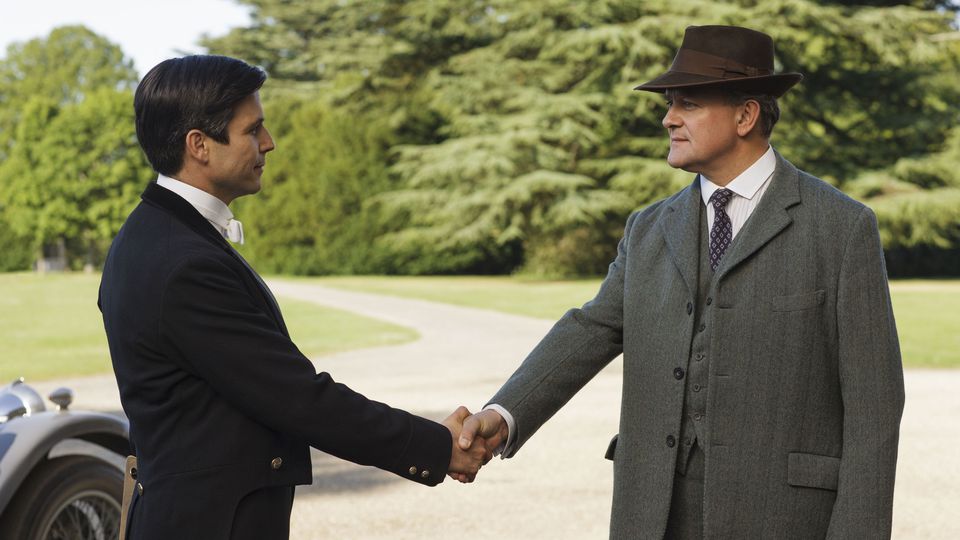MARCH 8, 2016
“Dog’s ass!”
This is what the hubby and I would yell out every Sunday night at 9pm for the past six years. In the first shot of the show’s opening credits, we’d see the legs of Lord Grantham and the rear end of his yellow Lab, and once we bellowed that phrase, we knew it was officially time for “Downton Abbey.”
Many years ago, I had been a fan of PBS’ “Masterpiece Theatre,” the former name of the current “Masterpiece,” but as the years passed, their mini-series came and went, and I paid little attention. Then I heard that they were about to premiere a limited series with the curious title of “Downton Abbey.” I was a big fan of the show’s creator, Julian Fellowes, whose script for Robert Altman’s brilliant 2001 film “Gosford Park” won Fellowes a screenplay Oscar. Plus it would also star Maggie Smith. Who in his right mind would pass up the chance to see Maggie Smith on TV every week?
If you’ve never seen “Downton Abbey,” you have your assignment — rent, stream or buy Season 1 of “Downton.” I guarantee you will be instantly hooked. For those of you have been faithful followers or momentarily drifted away just to come back for the finale, you will find, if you haven’t seen it already, the series finale to be very satisfying in how the fates of these characters, who have suffered so much, are finally resolved. Sorry, no spoilers here. But you won’t be disappointed.
This is the point in my usual reviews where I give a brief synopsis of the plot. With “Downton Abbey,” there is no such thing as a brief synopsis, so for newbies, here are the basics: Downton Abbey is the palatial estate of the aristocratic Crawley family who live upstairs, where their needs are met by the wide range of of people downstairs. The patriarch, Robert Crawley (Hugh Bonneville), whose title is Earl of Grantham, presides over the family, who includes his American-born wife Cora (Elizabeth McGovern) and their three daughters, ice princess Lady Mary (Michelle Dockery), sad sack Lady Edith (Laura Carmichael) and activist Lady Sybil (Jessica Brown Findlay). Judging from afar is Robert’s imperious mother, Violet (Smith), the Dowager Countess of Grantham.
With “Gosford,” Fellowes got the class differences between downstairs and upstairs down pat, but he was working in the guise of a murder mystery. However, “Downton” provides him with a much larger canvas with which to play. Like any good soap (and however highbrow its appeal, “Downton” definitely plays with the conventions of a soap opera), the series has an addictive appeal while putting new spins on familiar topics — infidelity, forbidden love, a murder trial, unexpected death, closeted homosexuality, the aftermath of rape and the power of family ties are all here. For me, at least, I think the most fascinating subject has been the changing role of women in the household — almost subservient in 1912 and now so powerful by 1925.
What “Downton” has that other soaps don’t is scope. The series begins with the devastating effect the sinking of the Titanic in 1912 has on the Crawley family, and through this family’s eyes we see so many of the world’s events over the next 13 years — World War I, a flu epidemic and the decline in power of the English aristocracy. It’s that extra element of the changing world just outside the doors of the estate that gives “Downton” much of its power and richness.
The show’s production values have always been first-rate, with gorgeous cinematography and set decoration. And the performances have all been across-the-board superb, particularly Dockery (who can make a potentially unpleasant character totally relatable) and Smith (whose way with a line is unmatched in Western Civilization).
But it keeps coming back to the writing and the singular voice heard in “Downton” throughout the show’s 52 episodes. There’s a reason for that — Fellowes wrote every word of those 52 episodes, an achievement that I don’t think even the prolific Aaron Sorkin can match. There’s a humanism to his writing that I think will make “Downton Abbey” feel as fresh 10 years from now as it does today. He writes characters who, now matter how despicable they behave at times, are completely recognizable and about whom the audience can care…in some cases, deeply.
If you’ve drifted away from “Downton” but still remember how you cared about these characters, track down a rerun of Sunday night’s series finale. I will guarantee you’ll end the episode with a smile on your face.












